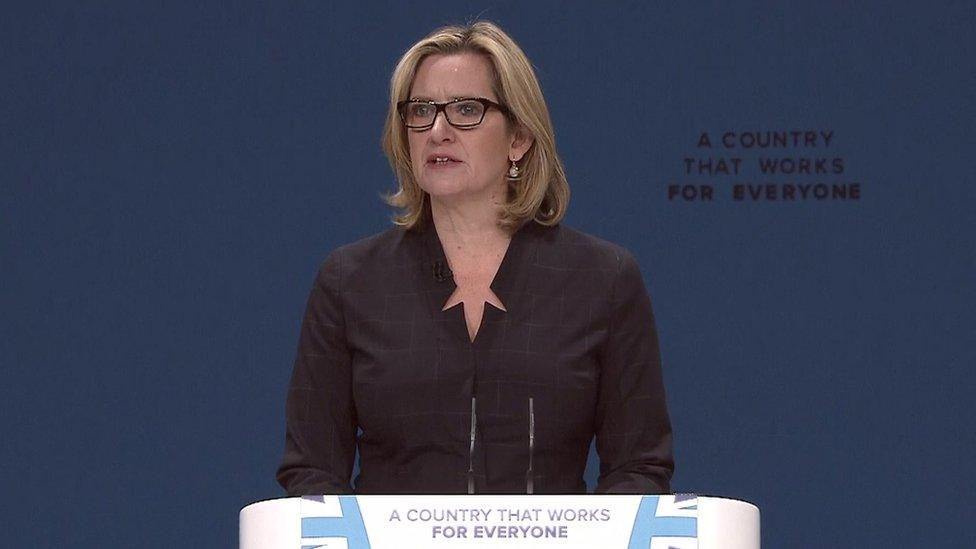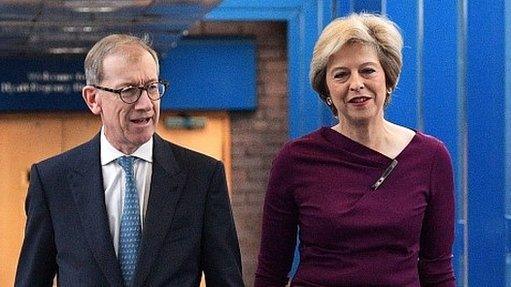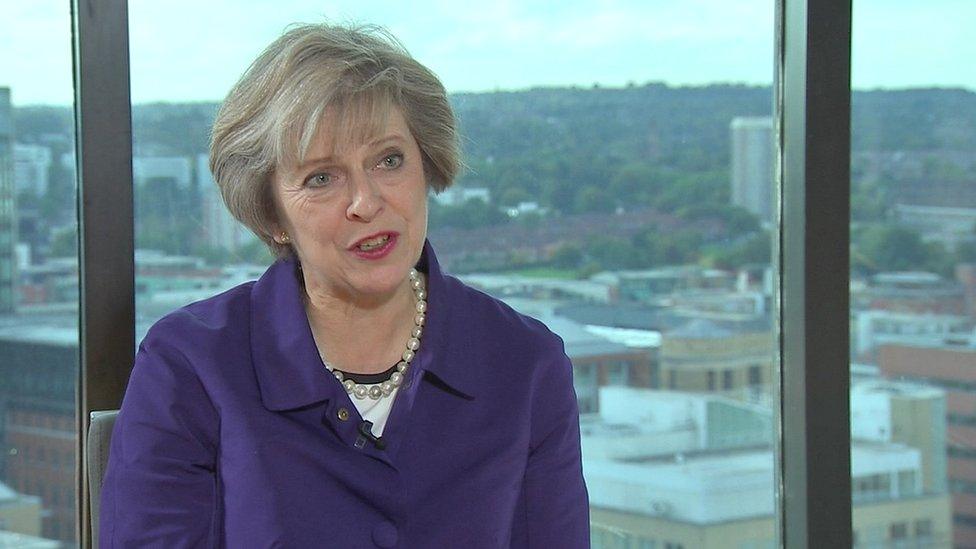New immigration curbs needed 'to change tide of opinion'
- Published

Ms Rudd said she voted to remain in the EU but accepted the result and the public concerns that underpinned it
New curbs on foreign workers and students may be needed to "change the tide" of public opinion on immigration, Home Secretary Amber Rudd has said.
She told the Conservative conference companies were "getting away" with not training British workers and tougher recruitment tests were needed.
Students on "low-quality courses" could also face tougher entry rules.
She promised councils £140m to address migration pressures and moves to deport EU criminals for "minor crimes".
In a wide-ranging speech, her first significant policy address since becoming home secretary in July, Ms Rudd also announced a further crackdown on illegal immigration through new powers to go after landlords, employers and banks that facilitate it.
But the proposals were met with concern by business groups while Labour said they would be taken with a "pinch of salt" given the government's failure to meet immigration targets.
Prime Minister Theresa May has said she is still committed to reducing net migration to "sustainable" levels - taken to mean below 100,000 a year - even though David Cameron failed to meet the target between 2010 and 2015, with net migration recently exceeding 300,000.
Ms Rudd, who campaigned to remain in the EU during the referendum, said immigration had brought benefits to the UK but the difference between those settling in the UK and those leaving was "too substantial" and that the Brexit vote had shown British people demanded action.
'Tick-box'
Although this would not happen "overnight", she said only a substantial reduction could help "change the tide of public opinion… so once again immigration is something we can all welcome".
"I come here today with a warning to those that simply oppose any steps to reduce net migration," she said. "This government will not waver in its commitment to put the interests of the British people first
"Reducing net migration back down to sustainable levels will not be easy. But I am committed to delivering it on behalf of the British people."

Universities must be more discriminating in the courses they offer, Ms Rudd said
Launching a consultation on entry rules for foreign workers and students, Ms Rudd said the tests that employers had to undergo before recruiting from abroad had become "tick-boxing exercises" and too often resulted in British citizens being discriminated against.
"The test should ensure people coming here are filling gaps in the labour market, not taking jobs British people could do," she said. "So I want us to look again at whether our immigration system provides the right incentives for businesses to invest in British workers."
While she was committed to attracting the best students from around the world, she said the current system too often "treated every student and university as equal" with insufficient consideration given to the contribution they could make to the UK against the obligations they placed on the state.
"Foreign students, even those studying English Language degrees, don't even have to be proficient in speaking English. We need to look at whether this one-size-fits-all approach really is right for the hundreds of different universities, providing thousands of different courses across the country.
"And we need to look at whether this generous offer for all universities is really adding value to our economy. This isn't about pulling up the drawbridge. It's about making sure students that come here, come to study."
'Bone of contention'
A new Controlling Migration Fund will help councils in England deal with the pressure on public services, such as the NHS and housing, from high volumes of immigration.
The Conservatives promised to introduce the fund in their 2015 election manifesto, having abolished a similar mechanism - set up by the last Labour government - in 2011.
Ms Rudd said the new migration fund would be more targeted and effective than its predecessor. It would, she said, support stretched councils and build on existing efforts to stop illegal immigrants receiving housing benefit, and tackle rogue landlords.
For Labour, shadow home secretary Andy Burnham welcomed the new money but said "we've heard these conference promises on net migration and child migrants before and they haven't come to anything".
Lib Dem universities' spokeswoman Lorely Burt said: "Cutting down on international student numbers would rob our economy of millions of pounds and do untold damage to Britain's world-leading universities."
The proposals also received a mixed response from business and the higher education sector.
The Institute of Directors said it was clear immigration would remain a "bone of contention" between employers and the government while ministers have been warned their plans could damage universities.
James Pitman, of Study Group, said: "The home secretary needs to be honest that a significant reduction in the number of international students will lead to upward pressure on the fees paid by British students, reduced investment in facilities, and damage to local economies."
Among a number of other pledges, Ms Rudd said EU nationals that repeatedly commit "minor crimes" would be liable to be deported while courts would get clearer guidelines on what they needed to take into account in cases involving EU offenders.
- Published3 October 2016

- Published4 October 2016
